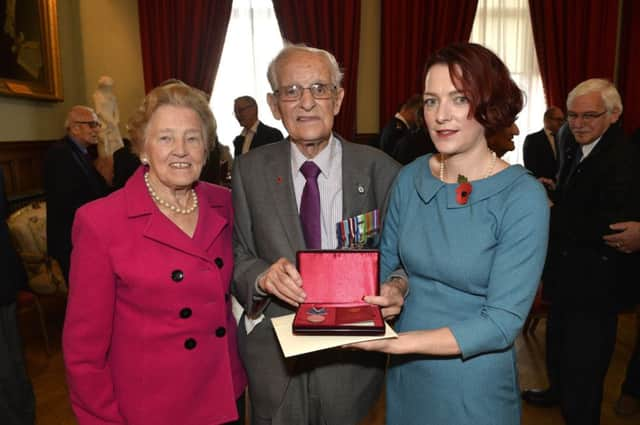Local war hero is honoured by Russia


Tommy was hailed a hero when he returned to Dromore in 1945 after surviving a torpedo attack on his ship, HMS Lapwing in March 1945.
The attack killed 158 of his fellow shipmates and Tommy was one of just 60 who survived the attack, clinging desperately to a lifeboat in the middle of the Arctic Sea.
Advertisement
Hide AdAdvertisement
Hide AdEven after all these years, Tommy can recall clearly the hours following the attack and the struggle for survival on a life raft in the icy sea.
Before the war he worked at Mackey’s engineering company in Belfast and whilst the staff were out on strike one of his colleagues suggested enlisting as something to do to ease the boredom. While his friends joined the army and air force, Tommy was the only one to join the navy for one simple reason - he liked the uniform!
He left his family behind in 1942 and began his naval training. He came home to Dromore on leave several times and always found it hard to go away again.
“Many times I came home and wished I wasn’t going back because I knew what I was going back to, “ he said.
Advertisement
Hide AdAdvertisement
Hide AdIn 1944 Tommy was on board one of the ships which escorted the American troops to Omaha Beach for the D-Day invasion. “We saw a lot of action and a lot of bodies too,” Tommy simply said.
After surviving the horrors of the D-Day landings, little did he know that a greater horror was yet to come. After D-Day his ship, HMS Lapwing, became part of the Russian Convoy, escorting ships through the treacherous, submarine-infested waters off the Russian coast.
The Lapwing left Greenock on its last voyage into Russian waters on March 11, 1945 and at 10.58am on March 20 a German submarine torpedoed the ship, knocking the captain unconscious.
Tommy recalls: “We knew there were submarines in the area but we didn’t think it would happen to us. When the torpedo hit I was blown about 10 yards down the deck and all I had was skinned knuckles. We got the order ‘every man for himself’ and in less than ten minutes there was no ship left.”
Advertisement
Hide AdAdvertisement
Hide AdTommy and some of his ship mates managed to climb onto a life raft. He remembers watching the ship vanish into the icy waters and feared that they would all be dragged under with it.
“The raft was attached to the ship with a rope. We were so scared that we would be pulled down. I was the only one with a knife so I got it out and cut the rope.”
Over the next two hours, Tommy drifted in and out of consciousness. He remembers 16 people on the raft but by the time they were rescued only six remained.
“It was snowing and I remember seeing the rescue boat coming through the haze but I blacked out just after that and don’t remember being rescued. Our worst enemy was the weather. Some of the men had been clinging to a rope on the raft and their hands had frozen around the rope so they had to break their fingers. It was an awful experience.”
Advertisement
Hide AdAdvertisement
Hide AdThe survivors from HMS Lapwing were rescued by HMS Savage. Once on board the survivors were examined by the ship’s doctor, who said they would only have survived another 20 minutes in the freezing conditions. In a bid to bring them round they were put under hot showers and as Tommy recalls: “They poured brandy down our throats.”
Before returning home, the six survivors had their photograph taken, a poignant reminder of the trauma they endured together. The six then parted company.
Tommy gathered with other veterans at the Belfast Harbour Commissioners Offices when Russian Ambassador Dr Alexander Yakovenko handed over 20 medals in a ceremony opened by the Duchess of Abercorn, founder of the Pushkin Trust.
Many of the men were in tears as the ceremony brought alive their memories of hardship, tragedy and losses of friends.
Advertisement
Hide AdAdvertisement
Hide Ad“My biggest worry was would I survive until I got the medal,” said Tommy. “A whole lot of others didn’t survive.
“It was a very emotional event and I was pleased to receive the medal.
“The Russian Ambassador spoke very well and it was really well organised. I couldn’t get over it.
“It was very different to how I received the Arctic Star, which arrived by recorded delivery with the postman.
“I have had a good day in my lifetime, and that was last Friday. And I have had a terrible day. That was March 20, 1945 when my ship was lost.”